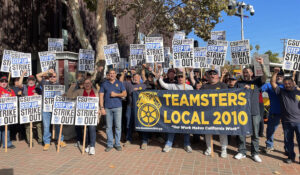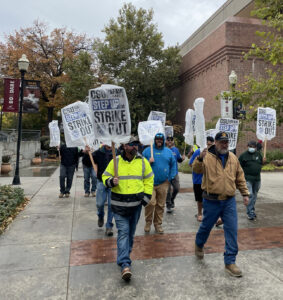CSU Teamsters make history
April 30, 2024
CSU Teamsters fought for salary steps and won.
Skilled Trades Teamsters at the California State University system didn’t just win big with our latest 2023-2026 contract, we won historically big.
“When CSU skilled trades workers joined Teamsters 2010, we set out to win back steps after decades of workers being left behind,” said Catherine Cobb, President of Local 2010. “Over five years, we took on the fight through member action, legislation, petitions, rallies and ultimately unprecedented statewide strikes—and we won!”
We staged the first statewide strike in Unit 6 history on Nov. 14, 2023. We struck in coalition with the California Faculty Association (CFA) for their first public strikes in recent memory. We protected critical job benefits and workplace rights, including the right to not have our work contracted out, ahead of tough financial times for the CSU. And, in our biggest, most history-making win of all, we won back salary steps for every CSU Teamster.
Under our new contract, with our new salary step system, CSU Teamsters will receive an average 16% raise by July of next year, with some Teamsters who had been left behind by the lack of step increases getting a raise of 20% or greater. Every Teamster will reach the salary step commensurate with their years of service in their classification by the final year of our contract, and our first year of raises is retroactive to July 2023.
Of the tremendous 84% of Teamsters who voted in our ratification process, 91% said yes. That overwhelming approval is because we didn’t just bring back the salary steps that had been missing since 1995—our new Teamsters Unit 6 contract created a salary step system that gets more money in workers’ pockets than ever before.
Even in 1995, the Unit 6 contractual salary step system had some critical caveats.
Under the previous step system, workers were eligible for step raises every year, generally on their anniversary of employment. However, eligibility was subject to performance evaluations, meaning a manager with a grudge could easily disqualify any worker from the raise they’d earned.
Salary ranges were also limited—most titles had a four-steps over five years range, so workers earned little more than 25% more money at the top of their salary range compared to the bottom.
While Unit 6 workers, then represented by the State Employee Trades Council (SETC), tried hard to improve this system, including expanding salary ranges and increasing the salary floors for members and apprentices, the salary step system came to an abrupt end in July 1995.
That year, a half-decade of public funding cuts to the CSU came to a head. The state subsidy to the CSU decreased by 21.3% between 1990 and 1995, and from 1992 to 1995, CSU received zero total dollars in funding increases from the state.
Although the CSU received a small bump in the 1995-1996 state budget, it was not enough to solve the system’s financial troubles, and so the CSU did what they usually do—took money out of the pockets of students and workers to keep campuses afloat. Students suffered a 10% tuition hike and the CSU moved to eliminate salary steps once and for all.
CSU’s brute-force bargaining tactics led to the Unit 6 salary system as it existed until our new 2023-2026 contract. Performance-based salary increases and In-Range Progression (IRP) increases replaced step raises, creating immense wage stagnation and even inversion over the next 28 years. Salary ranges grew under the 1995 contract, but at the cost of few workers ever moving through those ranges.
When SETC voted to affiliate with Teamsters Local 2010 in 2017, suddenly our new Teamsters brothers and sisters had access to all of the resources of both Local 2010 and the International Brotherhood of Teamsters and quickly got to work.
Unit 6 membership remained strong and was bolstered even more as Teamsters organized CSU workers into a strong, powerful union. With that power, Unit 6 workers secured strong raises in their first Teamsters contract, including a 10.2% compound raise over the first three years of the agreement, originally set to expire in 2020.
Teamsters also took our fight for salary steps to the State Capitol, co-sponsoring legislation to force the CSU to restore salary steps year after year—first with AB 1231 in 2018, then AB 369 in 2019, SB 566 in 2021, SB 410 in 2022, and a major request during the state budget process in that same year.
Together with CSUEU, Teamsters testified before legislators, rallied by the hundreds in Sacramento, won funding for the ground-breaking 2022 Mercer report on staff compensation, and fought tirelessly for our sponsored bills. Many of those bills passed through the legislature with overwhelming support, but were ultimately vetoed by Gov. Newsom.
After the pandemic, our Teamsters Local 2010 Bargaining Team knew that getting back salary steps had to be our top priority. Workers who had kept campuses running throughout the worst of the COVID-19 lockdowns were struggling to pay for housing, and even to buy groceries. Salary steps were critical, but our member-elected Bargaining Team knew that winning them back wouldn’t be easy—especially because we didn’t just want guaranteed steps back. We wanted them back without a requirement that workers have satisfactory performance evaluations on the books to receive the raises. If you’ve done the work to remain employed by CSU, you should get the raise that accompanies that work. End of story.

Local 2010 California State University Teamsters held the first in Unit 6 history on November 14, 2023.
“Basing the step raises on performance evaluations was the absolute last thing that CSU held on to,” President Cobb said. “We went into the last day of negotiations knowing we needed to get rid of the merit requirement and we knew it would be a huge fight.”
A fight CSU Teamsters decisively won, thanks to our months of show-stopping concerted actions. From the beginning of our negotiations with CSU until the end, Teamsters organized sticker actions and showcased our critical work on campus. We held practice pickets and marched with student groups. We rallied with fellow CSU unions outside of four bi-monthly CSU Trustees meetings while our brothers and sisters lobbied the Trustees inside, earning incredible press coverage and showing the power of our CSU coalition. We presented CSU Chancellor Mildred García with two-foot tall greeting cards signed by Teamsters at every CSU campus. We held a history-making statewide ULP strike on Nov. 14, 2023, shutting down vital infrastructure at 22 campuses, and did it again at four campuses from Dec. 4-7, together with CSU faculty and thousands of supportive students.
The strength of our Union was impossible to ignore. So when we called a five-day statewide strike with faculty in early January, CSU knew we were serious. When we said we need our salary steps back without merit requirements, they finally listened. And we won.
Early morning Jan. 19, days before our planned five-day strike, CSU gave in. Teamsters have salary steps back, better than ever, and we won’t allow them to be taken away again.





